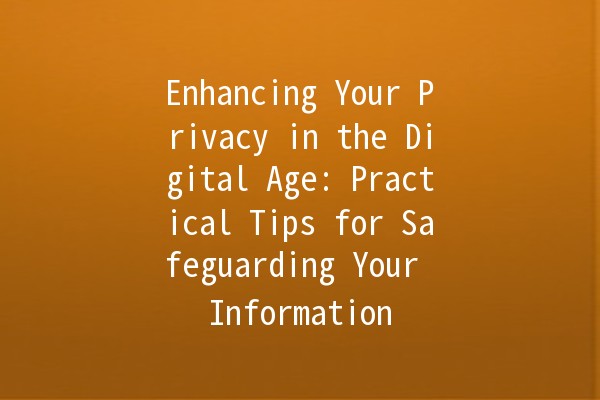




In today's interconnected world, maintaining privacy has become increasingly challenging. With every click, our personal information is more accessible than ever before. This article highlights practical strategies to enhance your privacy and security online. We’ll explore actionable tips that can help you protect your data effectively, ensuring your digital footprint remains minimal.
Privacy is the right to keep your personal information and activities secret. In an age where social media, online transactions, and digital footprints dominate, privacy breaches have skyrocketed. Protecting your privacy is crucial not only for your security but also for your peace of mind. When you secure your personal data, you minimize the risks of identity theft, financial fraud, and harassment.

Neglecting privacy can lead to severe consequences, including:
To foster a sense of security, it is essential to take proactive steps to protect your privacy online.
Here are five effective strategies to bolster your online privacy:
Description: Passwords are the first line of defense against unauthorized access to your accounts. Using strong and unique passwords is crucial.
Application Example: Instead of using easily guessable passwords like “123456” or “password,” create complex combinations with uppercase letters, lowercase letters, numbers, and special characters. For example, “P@55w0rD!2023!” is a strong password. Consider using a password manager to generate and store complex passwords securely.
Description: Twofactor authentication adds an extra layer of security by requiring a second form of identification aside from your password.
Application Example: For your email or social media accounts, enable 2FA. This often involves receiving a verification code on your mobile device each time you log in. Even if someone has your password, they cannot access your account without your phone, significantly reducing the risk of unauthorized access.
Description: Outdated software can lead to security vulnerabilities that hackers exploit.
Application Example: Make it a habit to update your operating system, web browser, and apps regularly. Enable automatic updates wherever possible to ensure you are always running the latest versions with security patches. This proactive step can protect your devices from malware and exploits.
Description: A VPN enhances your online privacy by encrypting your internet connection and masking your IP address.
Application Example: When using public WiFi networks, connect to a reliable VPN service. This secures your data from potential snoopers on the same network. Whether you’re browsing online or conducting financial transactions, a VPN helps to keep your activities private.
Description: The digital footprint encompasses all the traces of your online activity. Being mindful of what you share can greatly enhance your privacy.
Application Example: Regularly review your social media privacy settings. Limit the visibility of your posts and personal information to only trusted connections. Before sharing photos or updates, consider if they might reveal sensitive information.
The primary purpose of online privacy is to protect your personal information from unauthorized access and data breaches. By safeguarding your data, you can avoid risks such as identity theft, fraud, and invasion of privacy.
You can monitor data breaches by using services like "Have I Been Pwned?" This website allows you to check if your email address has been part of a data breach. Additionally, keep an eye on your financial accounts for unusual activity.
Using public WiFi poses security risks, as these networks are typically less secure. If you must use public WiFi, ensure to connect through a VPN and avoid accessing sensitive accounts or making financial transactions.
If you notice an increase in unsolicited emails or targeted advertisements, it could be a sign that your data is being shared or sold. Additionally, if you suspect that your accounts have been accessed without your permission, it is crucial to take steps to enhance your privacy.
It’s good practice to change your passwords every three to six months, especially for sensitive accounts. However, if you suspect a breach or your password has been leaked, change it immediately.
While you can take steps to resecure your accounts postbreach, restoring your complete privacy can be challenging. Monitor your accounts closely and consider using services that support credit monitoring and identity theft protection.
By implementing these practical tips, you can significantly enhance your privacy in the digital landscape. The effort you invest in securing your personal information can go a long way in protecting yourself from potential threats and ensuring a safer online experience.